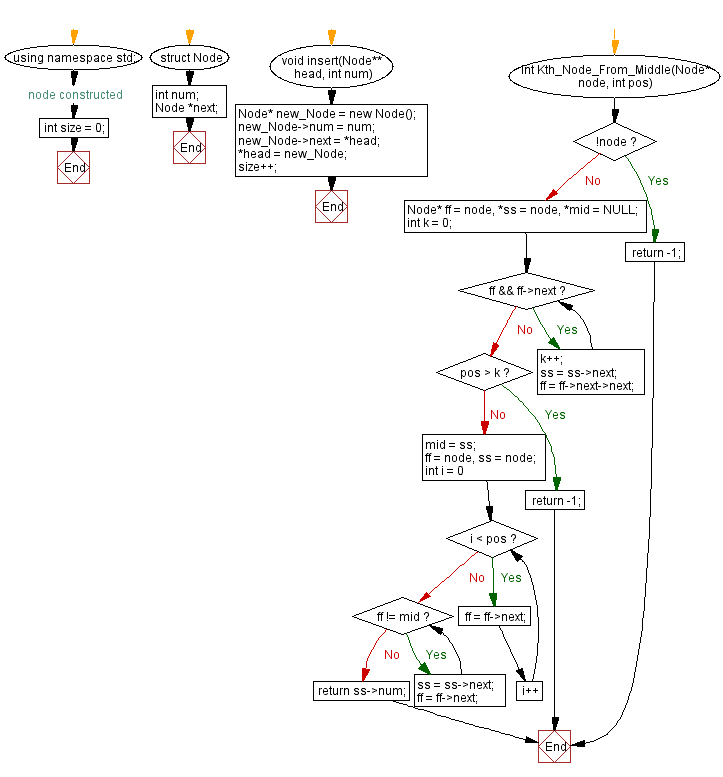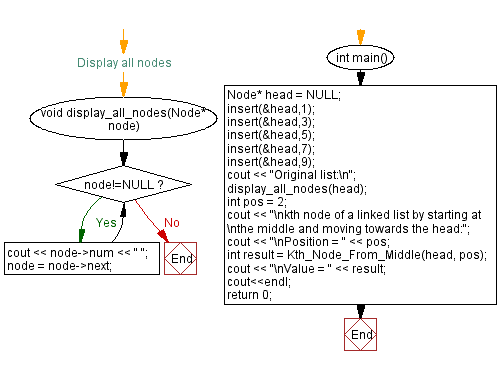C++ Linked List Exercises: Kth node from the Middle towards Head of a Linked List
14. Find kth Node by Starting at Middle and Moving Towards Head
Write a C++ program to find the kth node of a linked list by starting at the middle and moving towards the head.
Test Data:
Original list:
9 7 5 3 1
kth node of a linked list by starting at
the middle and moving towards the head:
Position = 2
Value = 9
Sample Solution:
C++ Code:
#include <iostream> // Including input-output stream header file
using namespace std; // Using standard namespace
struct Node // Declare a structure for defining a Node
{
int num; // Data field to store a number
Node *next; // Pointer to the next node
}; // Node constructed
int sizen = 0; // Initializing variable to keep track of the size of the linked list
// Function to insert a node at the start of the linked list
void insert(Node** head, int num){
Node* new_Node = new Node(); // Creating a new node
new_Node->num = num; // Assigning data to the new node
new_Node->next = *head; // Pointing the new node to the current head
*head = new_Node; // Making the new node as the head
sizen++; // Increasing the size of the linked list
}
// Function to find the kth node from the middle of the linked list towards the head
int Kth_Node_From_Middle(Node* node, int pos) {
if(!node) // If the linked list is empty
return -1; // Return -1 (Invalid position)
Node* ff = node, *ss = node, *mid = NULL; // Initialize pointers for finding the middle and kth nodes
int k = 0; // Initializing a variable to count the nodes from the middle
// Find the middle node using the two-pointer approach
while(ff && ff->next)
{
k++; // Increment count
ss = ss->next; // Move ss one step
ff = ff->next->next; // Move ff two steps
}
if(pos > k) // If the given position is greater than the nodes from the middle
return -1; // Return -1 (Invalid position)
mid = ss; // Set mid as the middle node
ff = node, ss = node; // Reset pointers ff and ss to the head
// Move ff to the kth node from the middle
for(int i = 0; i < pos; i++)
{
ff = ff->next;
}
// Move ff and ss until ff reaches the middle node
while(ff != mid)
{
ss = ss->next;
ff = ff->next;
}
return ss->num; // Return the value of the kth node from the middle
}
// Function to display all nodes in the linked list
void display_all_nodes(Node* node)
{
while(node!=NULL){ // Loop through all nodes until the end is reached
cout << node->num << " "; // Displaying the data in the current node
node = node->next; // Move to the next node
}
}
int main()
{
Node* head = NULL; // Initializing the head of the linked list as NULL
insert(&head,1); // Inserting a node with value 1
insert(&head,3); // Inserting a node with value 3
insert(&head,5); // Inserting a node with value 5
insert(&head,7); // Inserting a node with value 7
insert(&head,9); // Inserting a node with value 9
cout << "Original list:\n"; // Displaying message for the original list
display_all_nodes(head); // Displaying all nodes in the original list
int pos = 2; // Position of the node to be found from the middle
cout << "\nkth node of a linked list by starting at \nthe middle and moving towards the head:";
cout << "\nPosition = " << pos;
int result = Kth_Node_From_Middle(head, pos); // Find the kth node from the middle towards the head
cout << "\nValue = " << result; // Display the value of the kth node
cout<<endl; // Displaying newline
return 0; // Returning from the main function
}
Sample Output:
Original list: 9 7 5 3 1 kth node of a linked list by starting at the middle and moving towards the head: Position = 2 Value = 9
Flowchart:


For more Practice: Solve these Related Problems:
- Write a C++ program to locate the kth node by first finding the middle of the list and then traversing backwards.
- Develop a C++ program that computes the kth node from the middle towards the head in a singly linked list and displays its value.
- Design a C++ program to find the kth node from the middle using a combination of pointer reversal and counting techniques.
- Implement a C++ program to determine the kth element by starting at the middle of a singly linked list and traversing backwards while handling even-length lists.
CPP Code Editor:
Contribute your code and comments through Disqus.
Previous C++ Exercise: Delete the nth node of a Singly Linked List from end.
Next C++ Exercise: Create and display a doubly linked list.
What is the difficulty level of this exercise?
